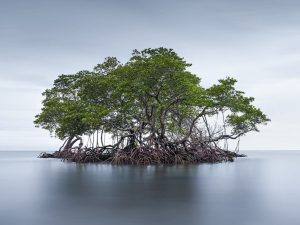Small island states are leading the charge against the climate crisis. Leaders of nine low-lying island nations have won a historic case at the UN’s maritime court. The group sought to hold countries to account for their greenhouse gas emissions (GHG). Now, the ruling means that rich nations will have clean up their act on ocean pollution through climate-wrecking GHG emissions.
Crucially, they have a responsibility to do so for small island nations bearing the brunt of the climate breakdown.
Ocean pollution and the climate crisis
In December 2022, the Commission of Small Island States on Climate Change and International Law (COSIS) launched a case at the UN’s maritime court the International Tribunal for the Law of the Sea (ITLOS).
A collection of small island states had formed the COSIS coalition at the 2021 COP26 climate summit in Glasgow. This comprises of Antigua and Barbuda, Tuvalu, Palau, Niue, Vanuatu, Saint Lucia, Saint Vincent and the Grenadines, Saint Kitts and Nevis, and the Bahamas.
In September 2023, ITLOS began a series of public hearings. As the Canary previously reported on the it:
The island states are asking the International Tribunal for the Law of the Sea (ITLOS) to determine whether carbon dioxide emissions absorbed by the oceans can be considered pollution. If ITLOS determines so, nations could have specific obligations to prevent it under the United Nations Convention on the Law of the Sea (UNCLOS). The international treaty binds countries to preventing the pollution of the oceans.
ITLOS has now unanimously ruled that this is the case. Specifically, it determined that carbon emissions are pollution under the United Nations Convention on the Law of the Sea (UNCLOS).
The UNCLOS treaty binds countries to prevent pollution of the oceans. Crucially, it defines pollution as the introduction of “substances or energy into the marine environment” that harms marine life. However, it does not spell out carbon emissions as a specific pollutant. So, plaintiffs in the case argued it should qualify.
As such, the ruling now obligates nations to reduce their GHG emissions to protect the ocean. Notably, in an expert opinion it said that:
Anthropogenic GHG emissions into the atmosphere constitute pollution of the marine environment
As a result, the court ruled that polluting countries therefore have:
the specific obligation to take all measures necessary to ensure that… emissions under their jurisdiction or control do not cause damage by pollution to other states and their environment
Small island states ‘fighting for their survival’
Ocean ecosystems create half the oxygen humans breathe and limit global heating by absorbing much of the carbon dioxide emitted by human activities.
However, increasing emissions can warm and acidify seawaters, harming marine life and ecosystems.
Soaring global sea temperatures are also accelerating the melting of polar ice caps. This causes sea levels to rise. Naturally, this poses an existential threat for small island nations.
The countries that brought the case called the court decision “historic”. Prime minister of Antigua and Barbuda, Gaston Browne, said small island nations were “fighting for their survival”. He emphasized that:
Some will become uninhabitable in the near future because of the failure to mitigate greenhouse gas emissions. We demand that the major polluters respect international law, and stop the catastrophic harm against us before it is too late
Global sea surface temperatures hit a monthly record in April for the 13th month in a row, according to the EU’s Copernicus Climate Change Service.
Rich nations must take responsibility for ocean pollution
So of course, small low-lying islands are shouldering the burden of climate breakdown. Alongside rising sea levels, they are particularly exposed to the impacts of climate-fueled extreme weather. For example, a World Meteorological Organization (WMO) analysis found that small island states had suffered devastating economic impacts from climate-exacerbated extreme weather. During fifty years of climate disasters between 1970 and 2021, for small island states:
one in five disasters had an impact “equivalent to more than five per cent” of GDP, with some disasters wiping out countries’ entire GDP.
Significantly, the ITLOS ruling has now laid out that countries’ climate action may need to go beyond the Paris Agreement for them to meet their legal obligations on marine protection.
Moreover, it found that states with the greatest historic responsibility for the climate crisis must step up and do more. Crucially, they need to address pollution from GHG emissions. The ruling distinguished between those with larger footprints and those least responsible for causing the climate crisis.
For example, an IPCC report highlighted that rich industrialised nations were responsible for approximately 57% of global greenhouse gas emissions between 1850 and 2019. Conversely, the poorest, least industrialised nations and small island states contributed just 0.4% and 0.5% respectively during this period.
The UN maritime court’s ruling echoed UN chief Antonio Guterres’ previous calls for rich nations to take action.
The ‘fates of two global commons’
Importantly, experts have said the ruling could be influential in shaping the scope of future climate litigation involving greenhouse gas (GHG) emissions.
While the court’s opinion is advisory and non-binding, it will influence how the UN treaty is interpreted around the world. In a press release ClientEarth lawyer Lea Main-Klingst said that:
Next year, states must improve the climate plans they submit to the United Nations – known as their Nationally Determined Contributions – and today’s outcome will be instrumental to push the countries most responsible for the climate crisis to ramp up their ambition.
Amnesty International’s head of strategic litigation Mandi Mudarikwa agreed the ruling was:
likely to inform future climate justice cases in national, regional and international courts
Main-Klingst also said that:
The momentum from today is only set to grow, as 2024 is a year of serious legal reckoning on climate change in international courts.
The Inter-American Court is hearing arguments on how climate change is impacting human rights this month in Brazil and the world’s highest court – the International Court of Justice – will be considering a similar question later this year.
The Center for International Environmental Law (CIEL) echoed this. CIEL attorney Joie Chowdhury stated that:
For the first time, an international court has recognised that the fates of two global commons – the oceans and the atmosphere – are intertwined and imperilled by the climate crisis
The Inter-American Court of Human Rights, and the International Court of Justice (ICJ) are due to give their rulings on these two other climate cases in the coming months.
Feature image via Youtube – CPDC NGO
Additional reporting via Agence France-Presse




